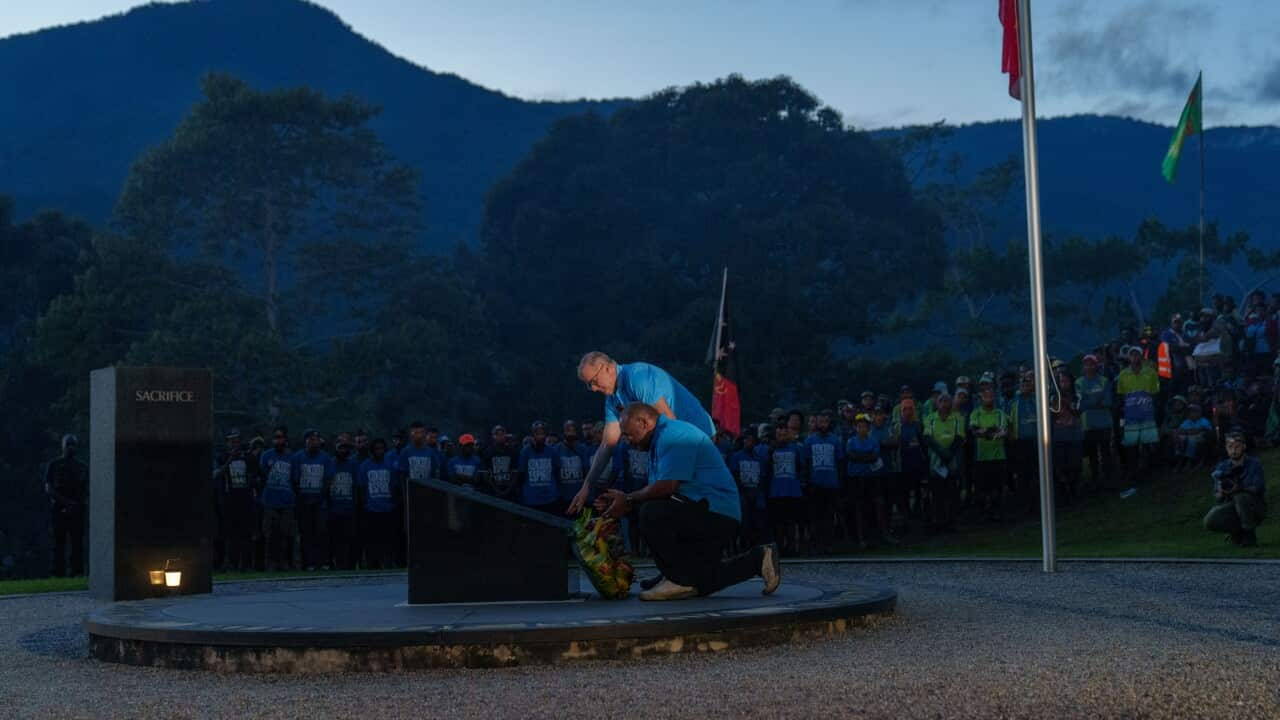More than 32,000 people gathered at the Australian War Memorial as dawn broke on ANZAC Day - honouring those who have served in past and present conflicts.
The national service is one of hundreds of gatherings across Australia, marking the 109th anniversary of the landings at Gallipoli.
Scott Bevan hosted the ceremony. He says the day is a reminder of the ANZAC spirit.
"We assemble here, at this special place of remembrance on this day, symbolically close to the time that the first Anzacs - young men from Australia and New Zealand - landed on a Turkish beach during the first World War. We gather to honour their bravery, their courage, their selfless comradeship, and their sacrifice under the most awful conditions. These were the men who created for their homelands the spirit of ANZAC. A spirit that gives us pride in who we are, and sets the standard for our Defence Force today."
Vice Admiral David Johnston says the foundation set by the ANZAC soldiers carries on in the Defence Force today.
" On defence sites around the nation you will find signs inscribed with five words: Service, courage, respect, integrity, and excellence. These are our values and our watchwords and they draw from the example and the sacrifice of those who gave their tomorrow is for our today. Every day the members of the Australian Defence Force walk in the footsteps of those who fought and died for Australia."
Director of the Australian War Memorial Matt Anderson says the site has a particular significance in commemorations.
"It's a very very powerful reminder that we're the center of the nation's commemoration and understanding of the Australian experience of war. It's not just about being a place where we honour our veterans but it's also a place where we seek to understand. If you go all the way back to when the Australian War Memorial was opened in 1941, the then Governor General, Lord Gowry said that when people leave the Australian War Memorial they should utter, never again, and hopefully that's also the case of ANZAC Day. We honour all those who have served, but we rededicate ourselves to the pursuit of peace."
Veterans will march at the memorials ground for the first time since 2019, with the pandemic and redevelopment of the memorial disrupting usual proceedings across the last four years.
Mr Anderson says he's happy to come good on a commitment made when the development was planned.
"In the midst of their major development, which of course is all about creating the space to tell the stories of contemporary service, Afghanistan, Iraq, and 63 peacekeeping missions. This year, we're inviting veterans back onto the parade ground at the front of the memorial. And that was a promise that we made, that the first people who marched in that program should be our veterans and they should do it on ANZAC Day."
The Australian War Memorial is the site of the service commemorating First Nations people who have served for Australia.
Nursing officer and Dunghutti woman, Helen, spoke at the the ceremony.
"We're meeting together to honour the memory of Aboriginal and Torres Strait Islander soldiers who have served, and to ensure their contributions are never forgotten. But our commemoration today is not just about looking back, it's also about celebrating our current service personnel and looking forward. It includes recognising the sacrifices of our communities, and our families, when we are away serving. And it includes recognition of our non-indignous brothers and sisters, partners, and allies who stand alongside us to craft future history that's more inclusive and speaks a bigger truth."
Traditionally, the Prime Minister attends the dawn service at the Australian War Memorial - but not this year.
Anthony Albanese is in Papua New Guinea, concluding his trek along the Kokoda Track alongside P-N-G Prime Minister James Marape with an ANZAC Day dawn service.
The two leaders completed a 15-kilometre section of the grueling 96-kilometre trail where Australian troops fought Japanese soldiers during World War II.
Mr Albanese told SBS News that the trek was a moving experience.
"It's inspirational what our soldiers did. And they couldn't have done it without the support of the local population here. But the hardship and sacrifice that they overcame is just extraordinary. We lost 625 Australians on the Kokoda track. It's extraordinary the courage that people far from home and in a very different climate and different environment showed."
Opposition leader Peter Dutton, attended the Bray Park dawn service in Queensland.
The Sydney dawn service in Martin Place is the longest running dawn service in New South Wales.
Master of Ceremonies Gareth McCray opened the dawn service ceremony in Sydney, commemorating the fallen soldiers of World War I, known as the Great War.
"The First World War endured from 4 August 1914 until 11 November 1918. It represents the greatest loss of life and the greatest number of casualties in Australia's history. This year, it has been 110 years since the start of the Great War. We have not nor will we ever forget those who served and died. The First World War was the crucible in which our nation was forged."
ANZAC services will continue throughout the day, in Australia, New Zealand, and further afield.
Minister for Veterans' Affair Matt Keogh ((key-oh)) is attending a dawn service in France. He told Sky News there's a significant contingent of Australians attending overseas services.
"Gallipoli this year, we'll have about 1,800 people, and here in Villers-Bretonneux, we'll have over 2,200, which is the most that we've seen since 2018, which was the centenary of the battle here. So, great to see Australians still turning out in droves, showing their commitment to honouring their family members that fought here and all Australians that fought here, and not just here, but around the globe."













